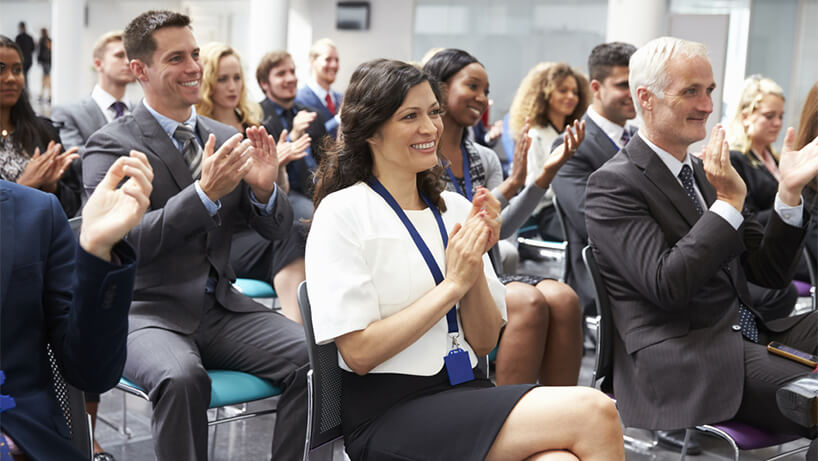Author: Richard Jebb
This Just In
Here’s a look at how to make all meetings better.
In the words of Taleb Rifai, former secretary-general of the U.N.’s World Tourism Organization, “The Meetings Industry provides immense benefits to the broader economy as it generates on average a higher spending level, reduces seasonality, contributes to the regeneration of destinations, spreads knowledge, and enhances innovation and creativity.”
The fact that you’re reading this means that you understand why much effort is spent on optimising the meeting experience with constant innovations in use of space, technology, engagement and, of course, food and beverage.
But thousands of organisations are meeting every day with little thought given to engagement or the quality of F&B, or delegate wellbeing.
Here’s an example. My partner works for a large international property company. Every six months or so, the entire UK division are brought together to meet in a 3-star hotel on the outskirts of Birmingham. The meeting sessions are long, breaks are infrequent, refreshments are scarce, and the only food served is … wait for it … hot dogs and chips.
I attend plenty of events hosted by organisations that have no vested interest in the events sector and I find no hint of the dynamism proffered by organisers of large, high-profile events. I wager that these lacklustre events are organised by someone in the organisation picking up the phone to a local hotel or conference centre, requesting a package, and choosing a date. No more thought is put into it. The conference sessions consist of a monotone speaker standing in front of a clunky PowerPoint presentation. In short, despite so many leading the charge for events and meetings that are better, there are many in the industry who simply aren’t engaged with this narrative at all.
Those engaged know the value of events and meetings are change and development for people, careers, organisations, industries, and destinations. And all of these factors would be much more powerful if the message was heard by everyone organising and attending events — not just the top echelons. It needs to filter down. Otherwise an enormous section of the industry is being missed — a section that seemingly doesn’t even know there is an industry.
Reaching people who have so far not taken onboard the potential to increase event ROI by improving the overall experience will not be simple. They have thus far avoided the buzz extolling the benefits of better meetings and events.
Consider for a moment the words of British Cycling’s performance director Dave Brailsford after his team won seven out of 10 track cycling gold medals at the London 2012 Olympics — matching their achievement from the Beijing 2008 Olympics. He said: “The whole principle came from the idea that if you broke down everything you could think of that goes into riding a bike, and then improved it by 1 percent, you will get a significant increase when you put them all together. There’s fitness and conditioning, of course, but there are other things that might seem on the periphery, like sleeping in the right position, having the same pillow when you are away and training in different places.
“Do you really know how to clean your hands? Without leaving the bits between your fingers?
“If you do things like that properly, you will get ill a little bit less.
“They’re tiny things but if you clump them together it makes a big difference.”
Those who are event-experience-improvement evangelists already know that the British Cycling team’s strategy works equally well when seeking to achieve event success. It is a useful analogy, because not only should stories that emphasise this effect be communicated to the unengaged members of our industry, but it is also how more will be converted to the cause.
By working together, employing a piece by piece strategy, we will gradually involve more people in the conversation.
What can be done?
Identify industries that could do events better. Target their media with your news releases and compelling case studies — tailormade to be relevant to meeting organising audiences in their sectors. You can even offer to talk at their events and start a dialogue with their trade associations.
We all encounter managers and directors from other industry sectors during our everyday working lives. Here’s a chance to become an ambassador for better meetings and events by championing the many benefits our industry can offer to those who take meetings seriously and treat event organising as a profession. Work meetings and events into conversations, tell stories, and give case studies that explain the power of well-produced meetings — have a selection of success stories readily available in your MICE-promoting arsenal. Aim to create new event evangelists by inviting them to see the exhibits at our industry trade shows and exhibitions.
Finally, what could be more compelling than an offer to help? Next time an organisation or individual is in the process of creating yet another lacklustre conference, offer a few simple suggestions that you know will make improvements, or go the whole way and get involved in organising the entire event.
What better way could there be to demonstrate the value of events than by your shining example?
Richard Jebb is a London-based writer.

